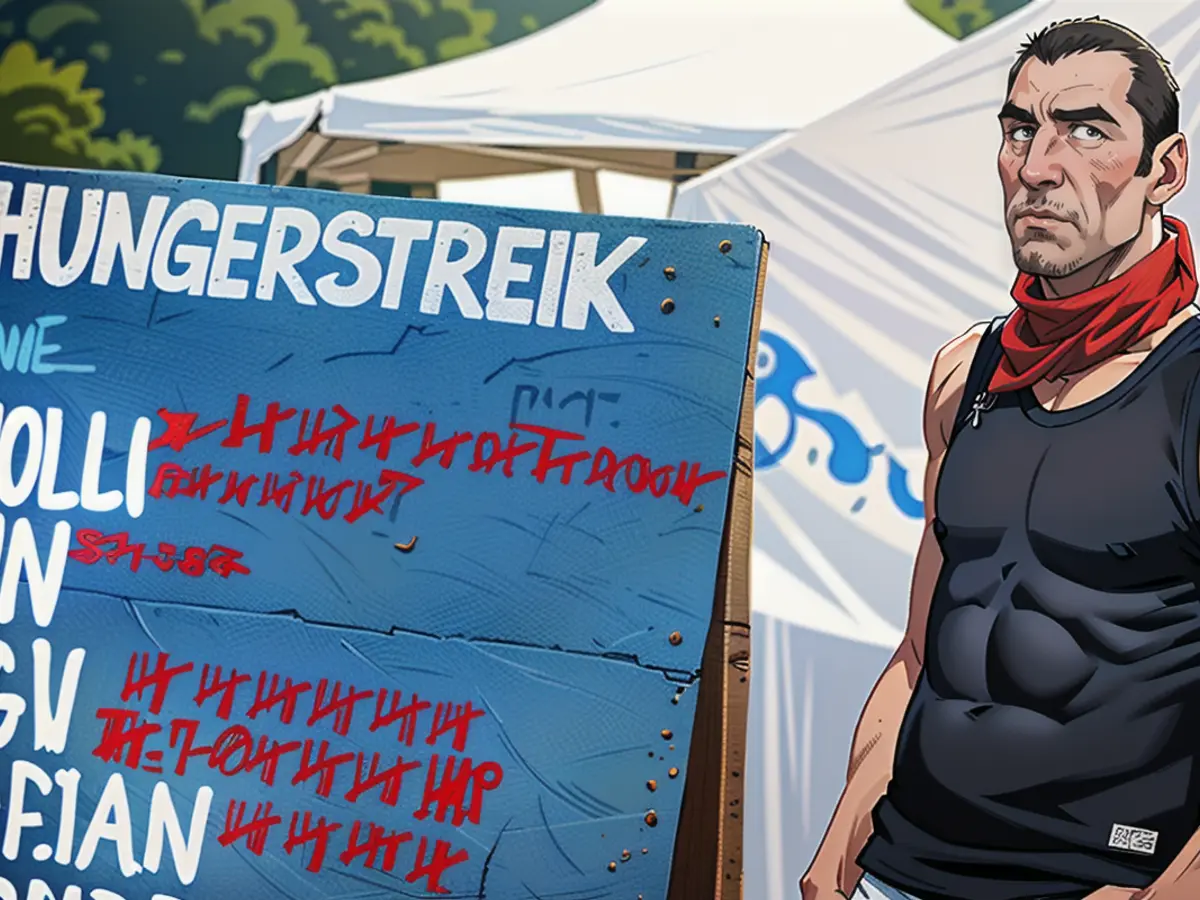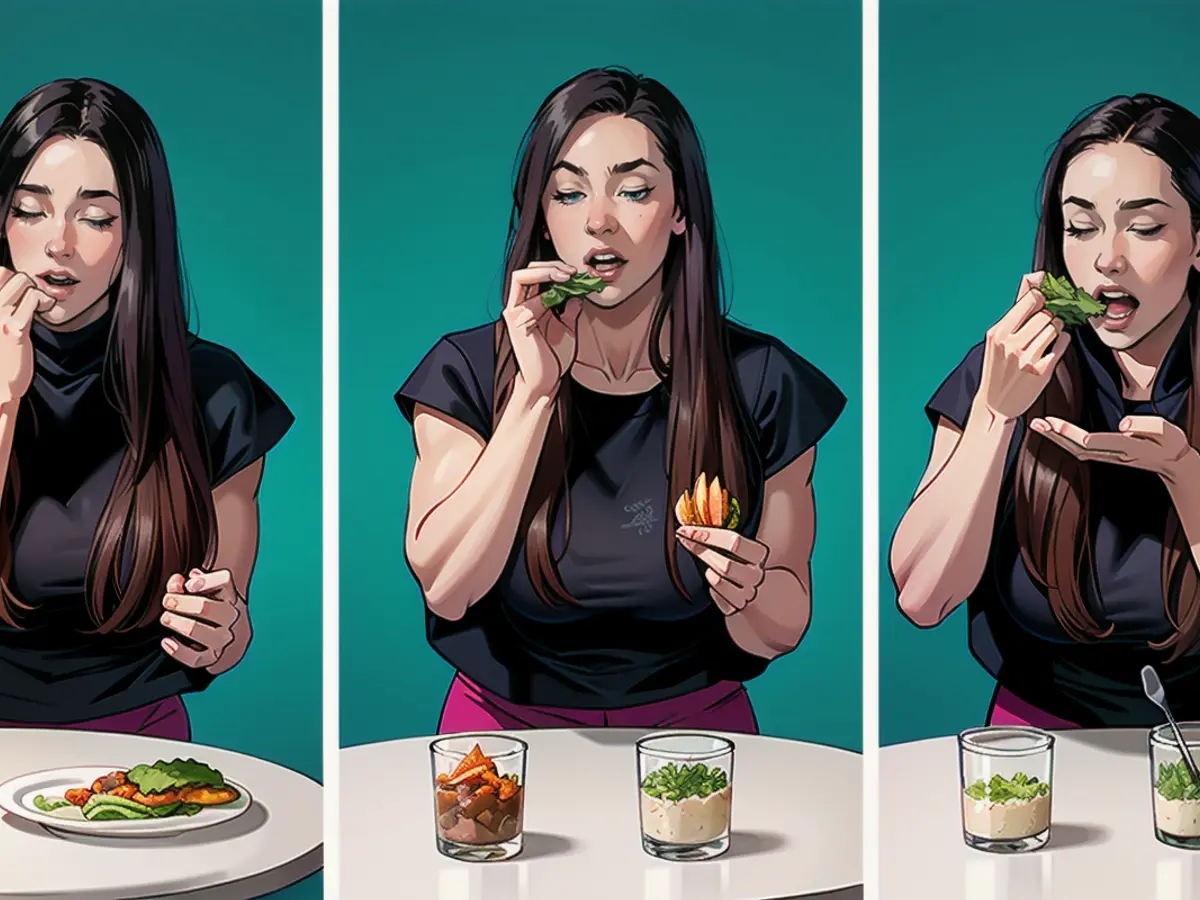Endure extreme hunger until physically incapacitated. - Individuals are reluctant to consume food in an effort to safeguard the environment, putting their lives at risk for the cause.
For about two months, Wolfgang Metzeler-Kick has refused to eat any solid food. He's currently maintaining his life with vitamins and juices, but he's now in the midst of a "dry hunger strike," which means he's also refusing liquids. His health has severely declined in the past week and is now considered a threat to his life, according to the movement "Hunger until you're honest." The risk of a heart attack or infection grows with each passing day, and he could collapse, fall into a coma, or die at any time.
Despite his deteriorating condition, Metzeler-Kick wants to continue his hunger strike.
How long will he last?
Dr. Susanne Koch is one of the three physicians and caregivers who visits the hunger strikers outside the Climate Ministry every few days. She's also part of the Scientist Rebellion group. She was asked by the Signal Group of Health 4 Future to care for the hunger strikers. This isn't her first time. Back in 2021, she was supposed to monitor a group of climate activists who wanted to talk to Chancellor Olaf Scholz while fasting. At the time, she declined, stating that "the activists were too young." With Metzeler-Kick and the other activists, she feels differently. "I can better understand their decision to fast," says the doctor.
She can't hide her concerns about the activists. Whether it's 61-year-old Michael Winter, 56-year-old Richard Cluse, 41-year-old Titus Feldmann, or 34-year-old Adrian Lack, Koch feels great sympathy for them. The fact that Winter had to be hospitalized and that Metzeler-Kick is nearing the end of his life is difficult for her to absorb.
The medical support team of three is unable to break through the activists' stubbornness. They can only care for and accompany them, check blood pressure and sugar levels, and measure heart rate. They can't do more.
For weeks, Koch and her colleagues have watched the hunger strike take its toll on the activists. Initially, their livers' sugar reserves were tapped into. This usually lasts one to two days, according to Koch. Then, their fat reserves were used. "The longer the fat reserves, the longer the hunger strike can be maintained," she says. Metzeler-Kick's fat reserves depleted in about four to six weeks, and now he's just losing muscle mass. Doctors also mention muscle atrophy, which can be dangerous. "Especially critical is when the heart muscle is attacked," says Koch. The risk of heart rhythm disturbances and heart failure increases the longer the hunger strike is maintained.
Hunger strikers take a few grams of carbohydrates, vitamins, and electrolytes daily to prevent lasting damage. These come in the form of brewing tablets or drinks. "We communicated from the beginning that this is important, and the activists have followed this," says Koch. However, Metzeler-Kick recently announced he would end his "dry hunger strike," and is now refusing carbohydrates. The 25 grams he was taking before seemed insufficient to her. The WHO recommends a daily intake of about 400 grams for people aged ten and above in the form of vegetables, fruits, and whole grain products.
Vitamin B1 is also on the menu for the activists. It's crucial for the nervous system. A deficiency can lead to fatigue, nausea, and headaches. At its worst, it can cause nerve pain, muscle and heart weakness, and swelling of the body - a condition reminiscent of beriberi, a condition usually only found in developing countries.
The activists know they're starving themselves to death. "If the health situation becomes critical, we'll of course discuss that then," says Koch. But they're not willing to intervene, even in an emergency.
It's illegal in Germany to force-feed or forcibly treat people against their will, according to lawyer Jan Moeck. This breaches medical ethics as well. "It's the principle of 'informed consent.' Patients decide, after being informed, which medical measures to take and which to reject," clarifies Moeck.
If a hunger striker becomes unconscious, doctors must follow the person's previous will. For Koch and her team, discussing their wishes with the activists beforehand is essential. "It's about accompanying the hunger strike without becoming furious, disappointed, or anxious," says the doctor. The two activists who were hospitalized willingly had initially collapsed and decided to admit themselves.
"More than likely, hunger strikers don't want to consider the possibility of their own death. If it comes to that, doctors should no longer be responsible for treating them since it's not the job of doctors to promote a patient's self-destruction," states medical attorney Moeck.
Susanne Koch intends to stay with the hunger strikers in Invalidenpark until they reach their conclusion, regardless of what that entails. If the activists choose to give up their hunger strike, they need to re-adjust to eating gradually to avoid life-threatening complications like electrolyte imbalances.
Medical professionals cannot provide an exact timeline for when the hunger strikers might have to cease their protest, depending on their health and nutritional intake. Without any liquid, death could occur within two to three days. Consuming water could prolong their fast up to 40 to 50 days, while adding electrolytes, vitamins, and juices could extend it even further, guesses Koch.
Regardless of the outcome in the Invalidenpark, Koch yearns "deeply for a positive resolution for everyone involved."







